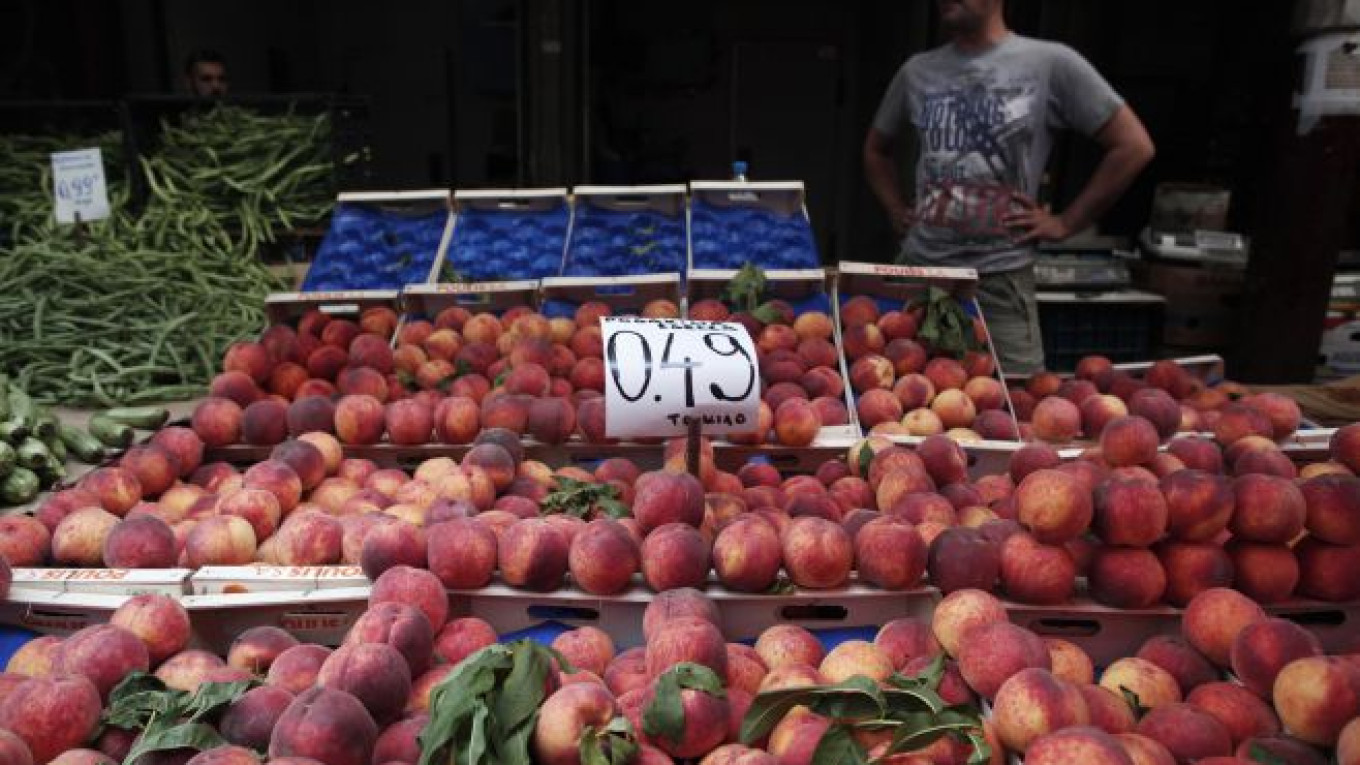BRUSSELS/LONDON – European Union regulators on Monday began analyzing product-by-product the impact of a Russian ban on EU food imports and agreed emergency measures to support peach and nectarine growers in what they described as a "signal of intent.”
The Russian ban, announced last week, was in retaliation for Western sanctions over Moscow's actions in Ukraine.
European Agriculture Commissioner Dacian Ciolos interrupted the traditional European Commission August break to return to Brussels at the weekend, together with other senior staff, and on Monday they set up a task force.
The aim is to work out alternative markets and to analyze the fallout from Russia's one-year ban on imports of meat, fish, dairy, fruit and vegetables from the United States, the EU, Canada, Australia and Norway.
With some member states piling on the pressure for redress, they could also agree to award compensation from a special 400 million euro ($535 million) fund signed into law at the end of 2013, as part of agricultural reforms. To date, the fund has never been used.
The European Commission decided to support the peach and nectarine sectors by increasing to 10 percent, from 5 percent, the share of production that can be withdrawn from the market and distributed for free. Producers are compensated for such fruit withdrawn from the market.
In addition, extra funds will be provided for marketing. The Commission did not specify how much money would be paid out, or if it would come from the 400 million euro fund.
"This first measure today is a signal of intent," Ciolos said. "We are monitoring markets closely and I will not hesitate to do likewise to assist other sectors dependent on exports to Russia, should it be necessary," he added.
Agricultural experts from the European Union's 28 member states will meet in Brussels on Thursday to plan a coordinated strategy.
'Rearranging Deck Chairs'
Last month, the European Union agreed its toughest sanctions yet against Moscow in response to Russia's annexation of Crimea and support for separatist rebels.
Moscow initially said it would not stoop to a tit-for-tat response, but last week it took aim at Western food imports, a move many analysts say could hurt Russian consumers more than it affects Western exporters.
Analysts said that as Russia turned to alternative suppliers in regions such as South America it could drive up prices in those markets and open up new opportunities for the EU and United States – whose prices would become more competitive.
"Rearranging the deck chairs on a ship is a good analogy right now," said Robert Yonkers, vice president and chief economist for the International Dairy Foods Association.
"Yes, some countries might see some short-term impact on demand for their dairy products. But in general, unless Russia is truly thinking of cutting off all imports of food stuffs, then there is still going to be a deck and there are still going to be chairs,” he said.
Ciolos has said he is confident the EU farm sector can quickly find new markets for exports to Russia worth around 11 billion euros ($14.7 billion) , roughly 10 percent of all EU agricultural sales.
A separate Russian ban on EU pork announced earlier this year has had relatively little impact, the Commission says, as farmers have found new markets in Asia and helped to fill the gap left by an outbreak of pig disease in the United States.
"Brazil, the only country now certified for [pork] export to Russia, is seeing its prices reach highs," the Brittany pork market association, MPB, said in a note on Monday.
"These price levels are having an effect on the world market and are of some benefit to European exporters who are able to compensate for the 'Russian void,'” the note said.
The loss of Russian demand can nevertheless have a very significant impact on the profitability of some producers.
"We've been under embargo for the past six months. We've ended up with 400,000 tons of pork on our hands," said Paul Auffray, a pig farmer in Brittany and president of the French pig farmers' group, the FNP.
"In six months we've lost 15-20 [euro] cents ($0.20-$0.27) on the price of a kilo of carcass," he said.
"Business is continuing as usual for luxury goods, weapons and oil. I get the impression that the food sector is the one paying the price,” Auffray added.
See also:
A Message from The Moscow Times:
Dear readers,
We are facing unprecedented challenges. Russia's Prosecutor General's Office has designated The Moscow Times as an "undesirable" organization, criminalizing our work and putting our staff at risk of prosecution. This follows our earlier unjust labeling as a "foreign agent."
These actions are direct attempts to silence independent journalism in Russia. The authorities claim our work "discredits the decisions of the Russian leadership." We see things differently: we strive to provide accurate, unbiased reporting on Russia.
We, the journalists of The Moscow Times, refuse to be silenced. But to continue our work, we need your help.
Your support, no matter how small, makes a world of difference. If you can, please support us monthly starting from just $2. It's quick to set up, and every contribution makes a significant impact.
By supporting The Moscow Times, you're defending open, independent journalism in the face of repression. Thank you for standing with us.
Remind me later.


